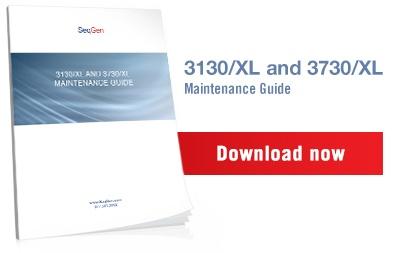Unexpected error messages can be frustrating, especially when they disrupt your sequencing workflow. One common issue that 3500 Series Genetic Analyzer users encounter is: “ERROR: Leak detected during bubble compression.”
If you encounter this message, follow these troubleshooting steps to identify and resolve the issue:
Step 1. Inspect the fluid system for visible leaks
Inspect the array port (location A) and lower polymer block (location C) for any physical leaks.

If you find leakage around the array port:
- Remove the capillary array.
- Thoroughly clean any polymer residues using damp Kimwipes or Q-tips.
- Reinstall the array, making sure the knob is locked tightly.
If there is leakage around the lower polymer block, clean the polymer residues around the buffer-pin valve (location B) and the lower polymer block using damp Kimwipes or Q-tips.
Step 2. Override the door sensor for further inspection
If no visible leaks are found, open the front door and use two pipette tips to block the door sensor. This allows the instrument to function as if the door is closed. Proceed with caution (see photo circled in red for sensor locations and the red rectangle for installed pipette tips).

Step 3. Perform spatial calibration with polymer fill
Go to the "Maintenance" tab and run a Spatial Calibration while filling the array with polymer (see photo for steps).

- Observe the array-filling process carefully.
- Inspect the polymer lower block (Location C) and the polymer pouch (Location F) for any signs of polymer dripping or backflow. If either of these issues is present, it suggests a potential fault in the polymer lower block or the check valve fitting (Location G).

Step 4. Check for hidden leaks & remove bubbles
If you're not seeing any visible leaks or backflow, keep in mind that minor leaks can still occur. Please try these steps:
- Check for any bubbles inside the pump chamber. If you find bubbles, run the Bubble Remove wizard to clear them out.
- Use conditioning reagent to run the Wash Pump and Channels wizard.
- Install a new, non-expired polymer to see if that resolves the issue.
- Make sure the water trap at Location D has enough water and that the syringe fitting at Location E is tightened properly.
If the error persists after following these steps, don’t hesitate to contact our experienced team of engineers for further troubleshooting and resolution. By carefully implementing these instructions, you can effectively address the “Leak Detected During Bubble Compression” error on your 3500 Series Genetic Analyzer and ensure your instrument continues to operate smoothly. For any additional assistance, our experts are always ready to help!
SeqGen specializes in the repair, maintenance, and refurbishment of essential laboratory instruments used in DNA sequencing and genetic research. Our expertise covers a wide range of equipment, including DNA sequencers like the ABI 3730/3730XL, 3500/3500XL, SCIEX LC/MS mass spectrometers such as the SCIEX 6500+, TECAN Freedom EVO liquid handlers, real-time PCR systems, thermal cyclers, and microplate readers. With experience in both current and legacy models, SeqGen provides cost-effective solutions at significantly lower prices than leading competitors.

